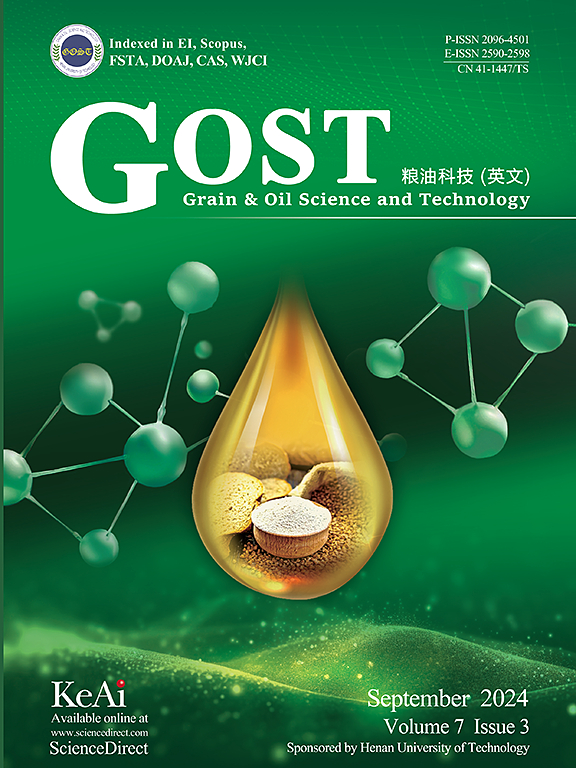灭菌方法对乳酸菌发酵豆腐品质及贮藏特性的影响
Q2 Agricultural and Biological Sciences
引用次数: 0
摘要
本研究考察了巴氏灭菌(PAS)、超声波灭菌(ULS)和微波灭菌(MWS)对卤水发酵豆腐(BFT)和发酵豆腐(FT)品质和贮藏特性的影响。对比分析表明,MWS对BFT和FT的结构完整性和感官特性的不利影响可以忽略不计,同时有效地保持了BFT和FT的持水能力(WHC),对其质地的影响最小。相比之下,PAS和ULS显著增加了硬度和咀嚼力(P <;0.05),但ULS也提高了豆腐的亮度。在贮藏过程中,豆腐的WHC、弹性和感官性能普遍下降,而硬度和嚼劲则增加。PAS-BFT和MWS-FT保持感官品质的时间最长,分别为14天和12天,并且在0-8天和0-6天内可以分解成更多的小分子肽,更容易被人体吸收。结果表明,MWS是最合适的豆腐杀菌方法,在保持豆腐品质、延长保质期和提高豆腐消化率方面具有较好的效果。本文章由计算机程序翻译,如有差异,请以英文原文为准。

Effect of sterilization methods on quality and storage characteristics of tofu fermented by lactic acid bacteria
This study examined the effects of pasteurization (PAS), ultrasonic sterilization (ULS), and microwave sterilization (MWS) on the quality and storage characteristics of brine-fermented tofu (BFT) and fermented tofu (FT). Comparative analysis revealed that MWS had a negligible detrimental effect on the structural integrity and organoleptic properties of BFT and FT, while effectively maintaining its water-holding capacity (WHC) and exhibiting the least impact on its texture. In contrast, PAS and ULS increased hardness and chewiness significantly (P < 0.05), but ULS also enhanced the brightness of tofu. Throughout the storage period, the WHC, elasticity, and sensory properties of tofu generally decreased, whereas the hardness and chewiness increased. PAS-BFT and MWS-FT maintained sensory quality for the longest periods of 14 and 12 days respectively, and could be decomposed to more small molecule peptides within 0–8 days and 0–6 days, which are more easily to be absorbed by the body. The findings discovered that MWS is the most suitable method for sterilization of tofu, with superior capability in maintaining the quality, extending shelf life, and improving digestibility of tofu.
求助全文
通过发布文献求助,成功后即可免费获取论文全文。
去求助
来源期刊

Grain Oil Science and Technology
Food Science
CiteScore
7.30
自引率
0.00%
发文量
69
审稿时长
12 weeks
期刊介绍:
 求助内容:
求助内容: 应助结果提醒方式:
应助结果提醒方式:


